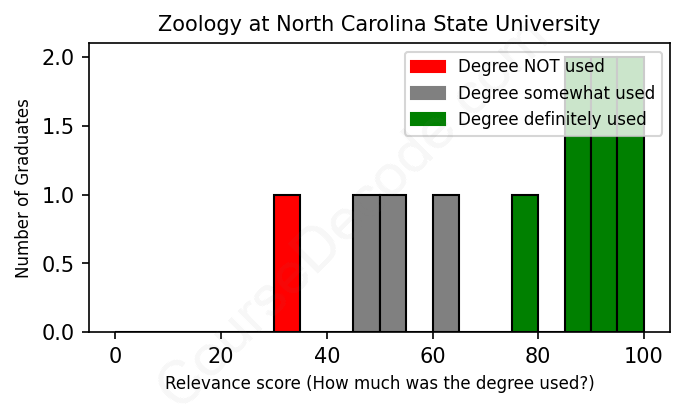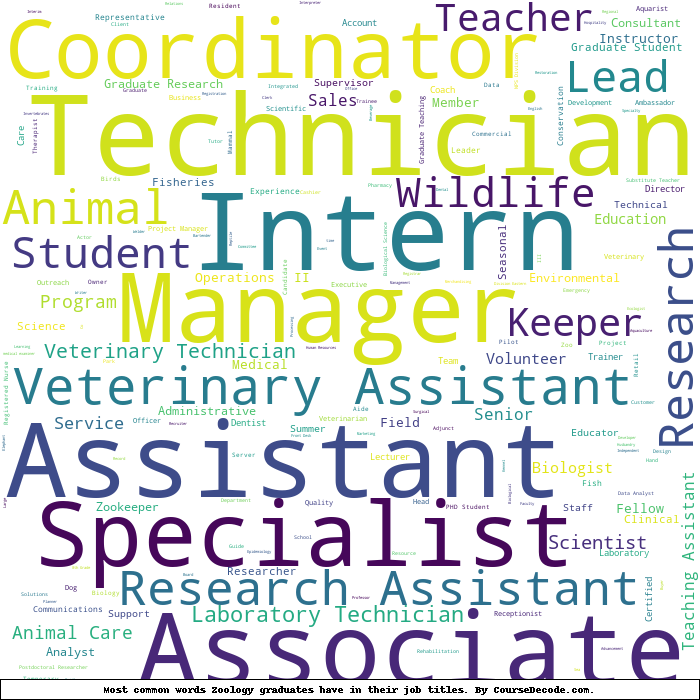
First, some facts. Of the Zoology graduates from North Carolina State University we've analyzed , here's how many have used (or NOT used) their degree in their career:

These are estimates based on AI analysis of 11 LinkedIn profiles (see below).
The verdict? Above average. Overall, with an average relevance score of 74%, Zoology graduates from North Carolina State University have a higher likelihood (+7%) of finding work in this field compared to the average graduate across all fields:
And for comparison, here's the chart for all profiles we've looked at across all degrees.
Also, after graduating, 45% of these graduates have pursued further education other than another Bachelor's degree (such as a Masters degree or other), compared to the average across all profiles of 35%. This suggests you may need more than just a Bachelors degree to be competitive as a Zoology graduate.
See the details:
|
Relevance score: 97% We think this person has gone into a career highly relevant to their degree. We think this person has gone into a career highly relevant to their degree.
DEGREE INFOGraduated in 2010 from North Carolina State University with a Bachelor of Science - BS in Zoology. Also pursued further education since (see below). JOB HISTORY SINCE GRADUATIONExhibit developer MSU Museum Jun 2011 - Dec 2011 National Science Foundation GK-12 Fellow  Kellogg Biological Station, Michigan State University May 2013 - May 2014 Instructor for Behavioral Ecology of African Mammals (study abroad course in Kenya)  Michigan State University May 2014 - Jun 2015 Inside Teaching MSU Fellow  Michigan State University Jan 2016 - Sep 2016 Content Curator  Project Biodiversify Aug 2017 - Present Budburst Education Manager  Chicago Botanic Garden May 2020 - Jan 2024 Program Manager of Student Research Experiences  Chicago Botanic Garden Jan 2024 - Present FURTHER DEGREES DONE SINCE GRADUATINGDoctor of Philosophy - PhDMichigan State University 2011 - 2019 ABOUTNo information provided. |
The top 10 most common jobs done by the graduates we've analyzed (ranked most common to least) are:
When checking out the career paths of folks who studied Zoology at North Carolina State University, it's pretty clear that many of them have remained connected to animal and environmental sciences. A significant number of graduates have taken on roles like Aquarists, Veterinary Technicians, and conservation-focused positions, which are directly related to the skills they picked up during their studies. For instance, working at museums and botanical gardens or as teaching assistants often involves a lot of biological education and biodiversity—key areas in Zoology. Many have also engaged in research roles like those at national parks or environmental agencies, applying their knowledge in practical settings that require a deep understanding of animal behavior and ecosystem dynamics.
However, not all paths have remained strictly within the bounds of Zoology. Some graduates have ventured into roles like data specialists, event planners, or customer service jobs that don’t really tap into their zoological background at all. These instances highlight that while a Zoology degree provides a strong foundation for a variety of biology-related careers, it doesn't always dictate a specific career trajectory. So while many have found relevant and fulfilling jobs right up their alley, others have taken more unconventional routes that may not leverage their Zoology expertise as much. Overall, it's a mixed bag, but there's definitely a solid trend toward jobs connecting back to their studies, especially for those sticking with science and education-focused roles.
Here is a visual representation of the most common words in job titles for Zoology graduates (this is across all Zoology graduates we've analyzed, not just those who went to North Carolina State University):

When it comes to graduates from North Carolina State University with a degree in Zoology, their career paths seem to have a mixed bag of outcomes. For many, the first jobs they land after graduation often relate to education, research, or wildlife conservation, which is pretty encouraging if you're passionate about animals and the environment. For example, several grads start off as interns, research assistants, or in educational roles, working in institutions like botanical gardens, museums, and conservation programs. These entry-level jobs not only provide relevant experience but also help build networks in the field. However, there are also those who have taken less direct routes, moving into roles like hospitality or retail—outcomes that don't exactly scream "zoologist."
Fast forward 5 to 10 years, and the trajectory seems to diverge even more. Some graduates have successfully landed impactful roles in conservation research, program management, and other significant positions within organizations focused on wildlife and environmental protection. For instance, several have stepped into roles with the U.S. Geological Survey, the National Park Service, or even the Smithsonian Institution. On the flip side, others appear to have drifted away from the zoological field altogether, finding themselves in unrelated sectors like data analysis or veterinary services, which while still connected to animal care, don't necessarily utilize their zoology expertise to the fullest. Overall, while many alumni have pursued fruitful careers within zoology and conservation, the field also sees its fair share of grads ending up in jobs quite far from their studies, showcasing both the opportunities and challenges in this area of study.
A Bachelor’s degree in Zoology can be a bit of a mixed bag, but it's generally considered challenging, especially at a solid university like North Carolina State University. You’ll be diving into topics like animal biology, ecology, and even genetics, which can get pretty detailed and technical. It’s not just about hanging out with cute animals; you’ll have to tackle some rigorous coursework, lab work, and maybe even field studies, which can all be pretty demanding. So, while it’s manageable if you’re passionate about animals and willing to put in the effort, don't expect it to be a walk in the park!
Most commonly, in the LinkedIn profiles we've looked at, it takes people 4 years to finish a Bachelor degree in Zoology.
Looking at the career paths of these North Carolina State University Zoology grads, it seems like they’re mostly getting by, but it’s a mixed bag. Some have landed solid positions, especially those who transitioned into roles like Program Manager or Senior Research Associate, which likely come with better pay and stability. On the flip side, others have pretty typical early-career jobs that probably don’t pay much—like part-time roles in retail or internships that don’t cut it financially. Overall, while some are climbing the ladder and probably making decent money, others might be struggling a bit, especially right out of college or in roles that don't tend to pay well in the conservation field. So, long story short, it looks like they have potential, but it really varies.
Here is a visual representation of the most common words seen in the "about" section of LinkedIn profiles who have a Bachelor degree in Zoology (this is across all Zoology graduates we've analyzed, not just those who went to North Carolina State University). This may or may not be useful:

Here are all colleges offering a Bachelor degree in Zoology (ordered by the average relevance score of their Zoology graduates, best to worst) where we have analyzed at least 10 of their graduates:
| College | Score | Count |
|---|---|---|
 North Carolina State University North Carolina State University
|
74 | 11 |
 Miami University Miami University
|
72 | 13 |
 Colorado State University Colorado State University
|
67 | 10 |
 Michigan State University Michigan State University
|
56 | 19 |